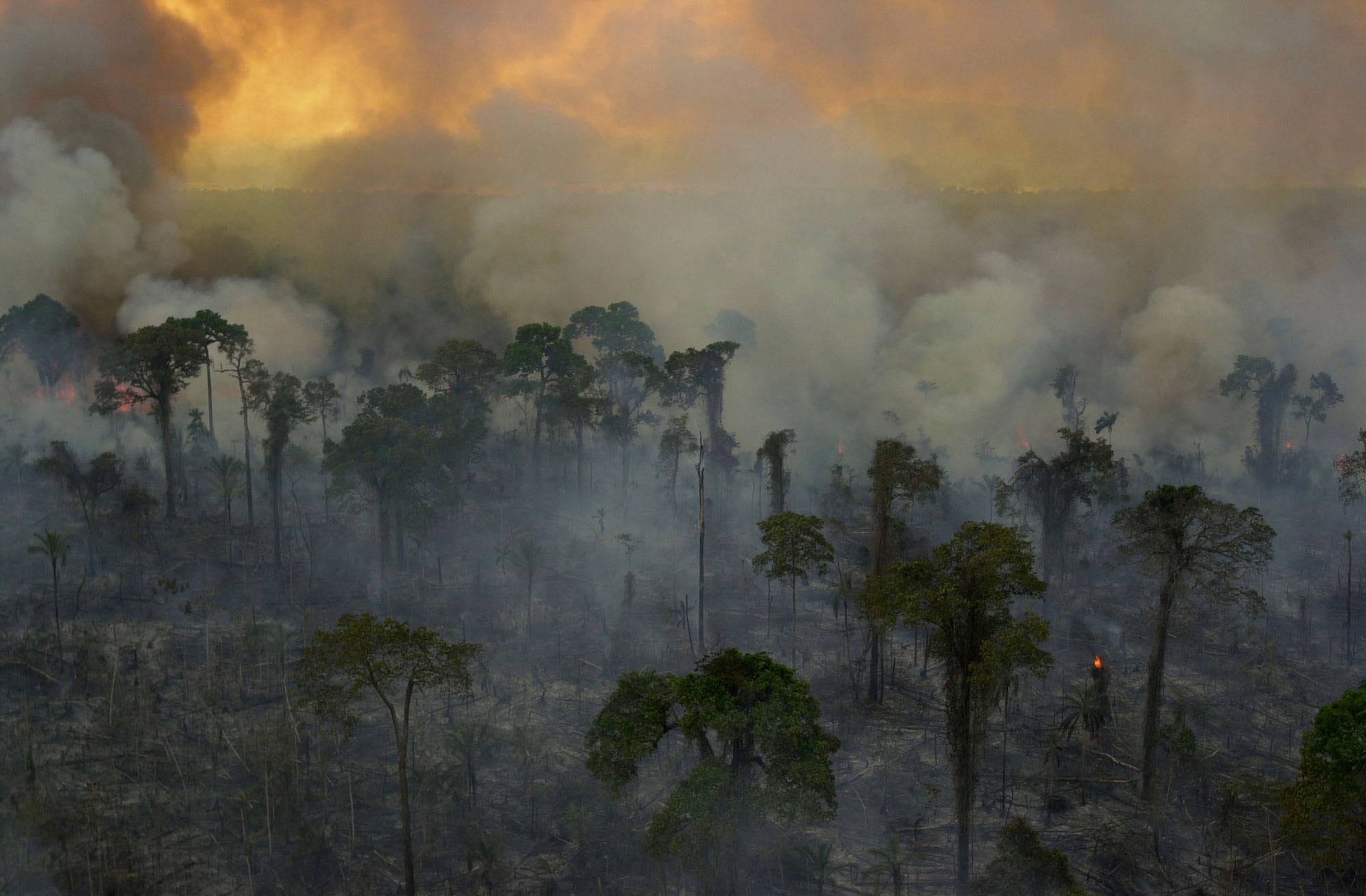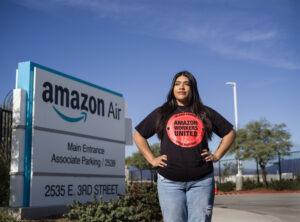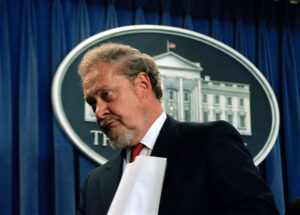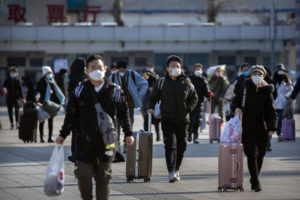The Amazon Is Burning, and the Entire Planet Is at Risk
Christian Poirer, director of Amazon Watch's Brazil program, assesses the imminent dangers of the region's raging rainforest fires. Dado Galdieri / AP
Dado Galdieri / AP
What follows is a conversation between Amazon Watch’s Christian Poirier and Dharna Noor of The Real News Network. Read a transcript of their conversation below or watch the video at the bottom of the post.
DHARNA NOOR: It’s The Real News. I’m Dharna Noor.
The Amazon Rainforest is burning at a record rate. The fires are so big that you can see the smoke from NASA space satellites. On Monday, the sky turned black over the city of Sao Paolo, Brazil and meteorologists found that the smoke filling the sky there was from fires thousands of kilometers away. Brazil’s National Institute for Space Research has documented almost 73,000 forest fires this year already. That’s an 84% uptick from what they saw in the same period last year. This comes amid a spike in deforestation in Brazil under right-wing President Jair Bolsonaro. He took office in January. But on Wednesday, Bolsonaro said that NGO’s are to blame for this uptake in fires. Now joining me to talk about this is Christian Poirier, who directs Amazon Watch’s Brazil program. Thank you so much for being here today, Christian.
CHRISTIAN POIRIER: Thanks for having me.
DHARNA NOOR: So, of course, a number of factors can contribute to these wildfires— increased dry periods because of climate change, increased logging, some fires are even created intentionally to clear land for agribusiness. Talk about all of those factors and why we’re seeing this huge spike in fires in the Amazon.
CHRISTIAN POIRIER: Under President Jair Bolsonaro, who is now in the eighth month of his tenure, we have seen an explosion in deforestation in the Brazilian Amazon. Almost all of this deforestation is considered illegal. One report said 95% of deforestation we’re seeing today should be considered irregular or illegal and this is due to the rhetoric of Jair Bolsonaro, and indeed his policies, which are entirely anti-environmental and antagonistic to human rights as well, especially to the rights of Indigenous peoples who occupy the Amazon, 22% of which is indigenous territories. So the giant spike in deforestation we’re seeing today, a 67% spike since last year, and the signals that Bolsonaro is sending to rural actors, farmers, and also illegal actors, militias and mafia’s that are operating with wanton impunity under his reign, is driving a process of illegal invasions of protected areas like Indigenous territories and other protected forests.
The intentional setting of fires, the 73,000 fires we are seeing today, almost all of these were set intentionally because in Brazil this is considered the burning season. This is not unusual, but what is unusual is the 84% spike since last year. This is a humongous growth in forest fire setting and the scale of these forest fires are unprecedented. What we see as well is Bolsonaro trying to shift the blame from his own real responsibility for the massive destruction of the Amazon and the attack on Indigenous and other traditional peoples who live there by shifting the blame to nonprofits, NGOs that are doing very good work to try to protect the Amazon and it’s peoples. This is a pathological denial of the truth that we all are quite aware with or quite familiar with here in the United States under Donald Trump. Fake news is a motto of these leaders.
It’s also a denial of the science. The stats you cited earlier, the 72,843 fires we witnessed today, are from Brazil Space Research Center, INPE. INPE’s director was sacked just a couple of weeks ago for telling the truth, for doing his job, for showing that deforestation’s on the rise. And Jair Bolsonaro went on record saying that this is fake news, that INPE is trying to smear Brazil’s reputation, when in fact it’s doing its job. It’s doing his job showing Brazilians and showing the world about the environmental catastrophe that is befalling the Amazon today.
DHARNA NOOR: Now, deforestation was on the rise even before Bolsonaro was elected. The National Space Research Institute that you just cited says that it’s been increasing since 2012, so how much worse has it gotten since Bolsonaro was elected and why? Who is he responding to? Why is he enacting all these policies allowing more logging, more deforestation in general?
CHRISTIAN POIRIER: Deforestation has indeed been rising since 2012 as you say, but the spike we’re witnessing today is of enormous concern. It’s incredibly alarming, and what Bolsonaro is doing is he’s responding to the calls of Brazil’s agribusiness sector, the people who actually brought him to power, to open up protected areas in the Brazilian Amazon to extractive industry and agribusiness and to infrastructure development. He is answering the call of this sector and doing their bidding.
Basically, Brazil’s agribusiness sector is running the show in Brazil today, alongside mining, and what we see is that these actors, who have long sought to open up protected areas, protected forests, Indigenous territories to their activities, are acting with impunity. They’re acting with incredible lawlessness and they’re seeing this complete absence of the state. The government has gutted the ability of the environmental agency IBAMA, to monitor and enforce environmental law in the Amazon. The signal that this sends is that these actors can go ahead and set fires to the forest, attack, invade, and terrorize, in fact even kill Indigenous peoples who live there with impunity. So this is of enormous concern. It’s not something we witnessed previously. This is very much what Bolsonaro has brought to the table as president.
DHARNA NOOR: You’ve mentioned the impact on the Indigenous folks still living in the Amazon, and of course, these fires there have a global impact, but could we talk a little bit about how they’re effecting the folks who are actually there? Some 1 million people are still living in the Amazon. You recently visited the Amazonian state of Para, where the Munduruku people live, I believe. What do these fires and these policies either contribute to them due to these populations, and then what kind of resistance is mounting amongst those populations too?
CHRISTIAN POIRIER: Well, Indigenous peoples are really on the front lines today of the most brutal attack on their rights and on the forest in 30 years. We’re seeing the rollback of 30 years of progress on human rights and environmental protections in Brazil today. Indeed, harkening back to Brazil’s military dictatorship, the times that Jair Bolsonaro eulogizes, that he calls back to all the time, and what he’d like to see is a regime installed that have a similar agenda of wanton destruction of the forest for so-called environmental progress. Indigenous people, as I mentioned, are suffering the brunt of this attack today. I was recently on the river Tapajos, in the state of Para. Para is burning today and I was with the Munduruku people. The Munduruku people have been resisting for centuries the incursions of outsiders, be them the Portuguese, a variety of other of other actors, including now today the Brazilian state who want to build dams on their river, who want to allow wanton destruction of their territories by way of logging and mining, and who are absolutely absent in their constitutional duty to title and defend Munduruku territories.
Just after I left Munduruku territory, the territory called Sawre Muybu, the Munduruku carried out what’s called an auto-demarcation activity because the state has not demarcated this territory, leaving it open to a variety of threats, acute threats that I witnessed—diamond and gold mining rampant in the region, polluting waterways, destroying forests. Then we have also illegal loggers acting completely in open impunity, and we see as well the Munduruku needing to resist and defend their territories on their own without any federal support. They went onto their territories and drove illegal loggers off of their land and did so on their own at great peril because these are armed militias we’re seeing them go up against today. The murder of the Wayampi leader in the Northern state of Amapa shows that stakes are rising for Indigenous peoples. The Munduruku and others are really on the front lines of these struggles and need to be supported.
DHARNA NOOR: Yeah, absolutely. But the stakes are rising for the rest of the world as well. A report from the Brazilian Research Center Imazon, showed that some 20% of the Amazon was destroyed in the 20th century. Then last month on The Real News, we spoke with Alexander Zaitchik who found in a report for The Intercept actually that if we lose another 20% of the Amazon— and that could happen in less than three years— it could trigger what scientists call this dieback loop, where the forest could start to dry out and burn on its own until it was completely obliterated. Of course, the Amazon stores carbon, so it slows global warming. It’s supplies 20% of the world’s oxygen. It’s also responsible for 10% of the world’s biodiversity. What happens if we lose the Amazon? What happens to the whole – the global population if we lose this incredible resource?
CHRISTIAN POIRIER: The Amazon is indeed approaching what specialist scientists have been calling a tipping point for some time. The moment it crosses that tipping point, it will no longer be able to create its own climate, its own rainfall, and sustain itself as the life-giving rainforest that we all need to act as a buffer against runaway climate change. The Amazon creates wet weather patterns around the world. It also creates rainfall for Brazil and for Brazil’s agribusiness sector, so it should be seen as an incredible shot in the foot for the sector to be sponsoring this wholesale destruction of the forest today. But if we see the Amazon lost, we will go with it. The Amazon is essential to our survival. It’s essential to the stability of our climate and we all have a responsibility to see that it’s protected.
DHARNA NOOR: What needs to happen to end this crisis? Who needs to be held accountable, and how do we do that?
CHRISTIAN POIRIER: Well, first and foremost, we need to hold the Bolsonaro regime accountable for its responsibility in driving this crisis today. But Bolsonaro has cut off ties with all forms of resistance to his government or even attempts to dialogue with his government from the social-environmental justice movements in Brazil, including Brazil’s national Indigenous movement. So what we’re seeing is that these movements are taking their movements, their struggles, to a global level, and they’re calling for accountability from international buyers of Brazilian commodities. Brazilian markets are very dependent on export commodities like soy and beef, timber and other commodities that are vulnerable to market pressures and political pressure abroad, especially in Europe, which is the second largest importer of Brazilian commodities. We need to see Europe take leadership at this critical moment to push back and say it will not be buying commodities from Brazil that are linked to illegal deforestation and rights abuses.
We need to see European politicians, the European Parliament – do not ratify the EU-Mercosur trade agreement under these conditions. We need to see that these trade blocks do not allow for open free trade under these conditions. We need to see much better standards put into supply chain management and the protection of forests and human rights foremost over trade. This needs to be conditions that are installed over any sort of trade regime to protect the Amazon because this is one language the Bolsonaro government will understand. International boycotts of conflict commodities, the closing of markets, this is the language they’ll understand. They’re not going to understand the language of dignity, of responsibility, of human rights, of environmental protection. Everything we expect from our leaders – they’re not going to hear this. So we have a responsibility internationally— in the North, in North America, in Europe, in Asia— to make a stand against this destruction because it’s all of our responsibility. It really implicates all of us.
DHARNA NOOR: Okay, well, as you at Amazon Watch continue to mount this disruption, continue to fight this, and document the struggle and the fights of Indigenous populations in Brazil and elsewhere, we’d love to hear from you again. Christian Poirier, the Director of Amazon Watch’s Brazil program. Thank you so much for being on The Real News Network today.
CHRISTIAN POIRIER: Thanks so much for having me.
DHARNA NOOR: And thank you for joining us on The Real News Network.
Your support matters…
Independent journalism is under threat and overshadowed by heavily funded mainstream media.
You can help level the playing field. Become a member.
Your tax-deductible contribution keeps us digging beneath the headlines to give you thought-provoking, investigative reporting and analysis that unearths what's really happening- without compromise.
Give today to support our courageous, independent journalists.






You need to be a supporter to comment.
There are currently no responses to this article.
Be the first to respond.